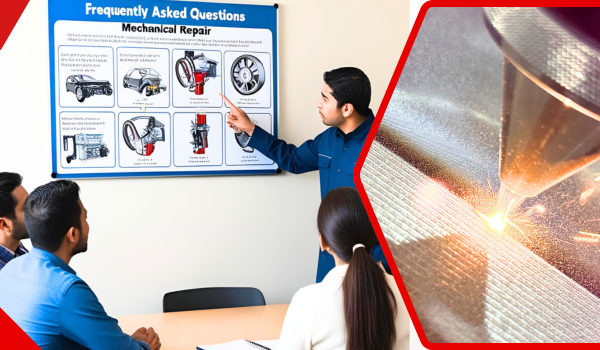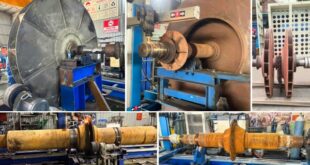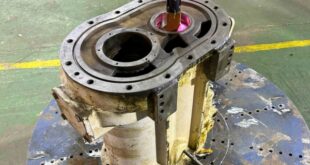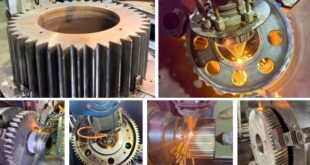Clear and concise answers to help you better understand Laser Cladding – one of the most advanced surface restoration and coating technologies today.

-
What is Laser Cladding?
Laser Cladding is an advanced technology used to restore and enhance the surface of mechanical components. It works by applying metal powder or wire onto the surface and melting it with a high-energy laser beam, forming a metallurgically bonded coating layer.
How it works:
- A laser beam is directed at the target surface.
- At the same time, metal powder (or wire) is fed into the laser-affected area.
- The laser melts the added material and a thin layer of the base material, forming a strong bond.
The coating cools rapidly, creating a hard, durable, wear- and corrosion-resistant surface.
-
How is Laser Cladding different from traditional welding or thermal spray?
| Criteria | Traditional Welding | Thermal Spray | Laser Cladding |
| Heat distortion | High | Medium | Low |
| Coating adhesion | Moderate | Weak | Very strong |
| Precision | Low | Medium | Very high |
| Coating thickness control | Difficult | Inconsistent | Highly accurate |
| Component lifespan | Short | Moderate | Long |
-
What kind of components should be restored with Laser Cladding?
Worn components after long use
- Examples: shafts, bearings, journals, gears…
- If the surface is worn but the core material remains intact, Laser Cladding can restore the surface with high precision.
Components working in harsh environments
- Highly corrosive (chemical, marine) or high-temperature/pressure environments.
- The coating provides excellent resistance to wear, corrosion, and oxidation.
Complex or hard-to-machine parts
- Examples: turbine blades, precision molds, aerospace components…
- Laser Cladding allows localized coating without affecting the entire part.
Out-of-stock or costly replacement parts
For imported machinery, legacy systems, or custom-made parts that are hard to replace, Laser Cladding is a cost-effective solution.
Components that need surface upgrades
Not just for repair – you can also use Laser Cladding to enhance surface hardness and wear resistance on new or used parts.
-
Is the Laser Cladding coating durable?
Yes. Coatings can reach 60–65 HRC hardness with excellent metallurgical bonding, resistant to wear, corrosion, and high temperatures. In many cases, coated parts last 2–5 years depending on working conditions.
-
How thick can a Laser Cladding coating be?
Typically from 0.1 mm to 2 mm, and more if required. A major advantage is the precise control of thickness without damaging the base material.
-
Is post-heat treatment required after Laser Cladding?
Generally not, because the process introduces minimal heat distortion or residual stress. However, for certain high-performance applications, post-treatment may be recommended.
-
What materials can be used for Laser Cladding?
- Nickel-based alloys (Ni): Inconel 625, 718
- Cobalt-based alloys (Co): Stellite 6, CoCr
- Iron-based alloys (Fe): FeCr, FeNi
- Super-hard materials: Tungsten Carbide (WC), NiCrBSi…
- Custom material blends can also be used based on application needs.
-
Is Laser Cladding expensive?
The upfront cost may be higher than traditional welding, but it helps save 30–70% in long-term operating costs by avoiding part replacement and reducing machine downtime.
-
How long does Laser Cladding take?
It depends on the part’s size and complexity. Restoration typically takes 1–5 working days, but can be faster or longer depending on the condition of the part.
-
What do I need to prepare to send a part for Laser Cladding?
- Technical drawings (if available) or actual part photos
- Clear restoration requirements: dimensions, hardness, working environment, etc.
- Contact the service provider to get advice on suitable cladding material
Conclusion
Laser Cladding is a modern, precise, and cost-effective solution for both repairing and enhancing mechanical parts. Understanding these common questions will help you make informed decisions, save costs, and optimize your production efficiency.
Contact us for consultation and support:
PHUONGDONG INDUSTRY & TRADING CO., LTD
Address: Alley 70, Dan Di, Uy No, Dong Anh, Hanoi, Vietnam
Phone/Zalo: 0987.822.360

 Laser Cladding Phương Đông
Laser Cladding Phương Đông


